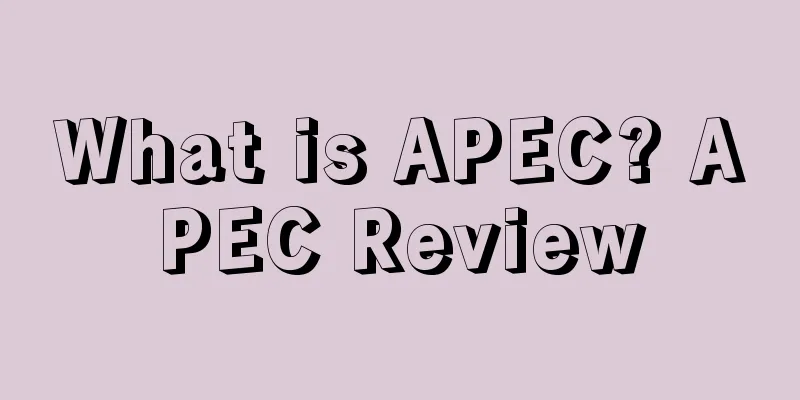What is APEC? APEC Review

|
Asia-Pacific Economic Cooperation (APEC) is an important economic cooperation forum in the Asia-Pacific region and the highest-level intergovernmental economic cooperation mechanism in the Asia-Pacific region. Its official advisory body is the Association of Pacific Rim Universities. Official website : http://www.apec.org Founded in 1989 Established in 1989, APEC now has 21 member economies. APEC is a forum for economic cooperation, which operates through non-binding commitments and voluntary participation of members, emphasizing open dialogue and equal respect for the opinions of all members, unlike other intergovernmental organizations established through treaties. "APEC" and "Asia-Pacific Economic Cooperation" are both registered trademarks of APEC. From November 5 to 7, 1989, the first ministerial meeting of APEC was held, marking the establishment of APEC. In June 1993, it was renamed APEC. In November 1991, China formally joined APEC as a sovereign state, and Chinese Taipei and Hong Kong formally joined APEC as regional economies. APEC has a total of 21 members. In October 2001, the APEC Leaders' Informal Meeting was held in Shanghai, China. This was the first time that the APEC meeting was held in China. In 2014, the APEC Leaders' Informal Meeting was held in China again after 13 years. As of September 2014, APEC has 21 formal members and three observers. History Background The Asia-Pacific Economic Cooperation (APEC) was born at the end of the global Cold War. In the late 1980s, with the end of the Cold War, the international situation gradually eased, and the trend of economic globalization, trade and investment liberalization, and regional grouping gradually became a trend. At the same time, the proportion of Asia in the world economy also increased significantly. The organization has played an irreplaceable role in promoting regional trade and investment liberalization and strengthening economic and technical cooperation among members. It is a forum for promoting economic growth, cooperation, trade and investment among regions in the Asia-Pacific region. Development History In January 1989, Australian Prime Minister Bobby Hawke initiated the "Ministerial Conference of Asia and the Pacific Countries" in Seoul during her visit to South Korea. From November 6 to 7, 1989, the 12 founding member states held the first "Asia-Pacific Economic Cooperation Ministerial Conference" in Canberra, Australia. From November 12 to 14, 1991, the third ministerial meeting was held in Seoul, South Korea (now Seoul) and adopted the Seoul Declaration, which formally determined the purpose and objectives of APEC, the scope of work, the mode of operation, the form of participation, the organizational structure, and the prospects of APEC. The goal of APEC is to continuously promote regional growth and development for the general welfare of the people of the region; to promote economic complementarity and encourage the flow of goods, services, capital, and technology; to develop and accelerate an open and multilateral trading system; and to reduce trade and investment barriers. This meeting also formally included the three economies of China, Hong Kong, China, and Taipei, China into APEC. From September 10 to 11, 1992, the Fourth Ministerial Meeting was held in Bangkok, Thailand, at which it was decided to locate the APEC Secretariat in Singapore and to establish the budget rules for the APEC Operating Fund. In January 1993, the APEC Secretariat was established in Singapore to be responsible for the organization's daily affairs. On November 20, 1993, the first APEC Economic Leaders' Meeting was held on Blake Island in Seattle, the United States, and it was declared that the purpose of APEC is to seek stability, security and prosperity for the people of the Asia-Pacific. On November 15, 1994, the Economic Leaders' Meeting held in Bogor, Indonesia established the "Bogor Goals": developed member countries will achieve free and open trade and investment in the Asia-Pacific region before 2010, and developing member countries will achieve free and open trade and investment in the Asia-Pacific region before 2020. The early liberalization of sectors in 1997 went beyond the reality of the Asia-Pacific region to a certain extent and could not be carried out as originally envisioned. Economic and technical cooperation has been able to maintain its momentum, but due to the negative attitude of developed members, it will take some time to achieve substantial progress. In 1998 and 1999, APEC entered a period of adjustment, including consolidation, hesitation and further exploration. The 2000 Informal Leaders' Meeting reaffirmed the need to adhere to the trade and investment liberalization goals set in Bogor and to strengthen capacity-building activities in the areas of human resources, infrastructure and markets. In November 2021, Thailand officially took over the rotating presidency of APEC from New Zealand and became the host of the 2022 APEC meeting. On the 18th, the Thai Ministry of Foreign Affairs held an award ceremony for the 2022 APEC logo design competition and announced the 2022 APEC logo for the first time. Previous meetings On November 20, 1993, the first informal meeting of APEC leaders was held on Blake Island in Washington, the United States. The meeting discussed three topics: the economic outlook for the Asia-Pacific region in the 21st century, promoting cooperation within APEC and between regions, and related mechanisms and means, and issued the APEC Leaders' Economic Outlook Statement. On November 15, 1994, the 2nd APEC Leaders' Informal Meeting was held in Bogor, Indonesia. The APEC Economic Leaders' Declaration of Common Determination (hereinafter referred to as the Bogor Declaration) adopted at the meeting established the goal of achieving trade and investment liberalization in the Asia-Pacific region and proposed a timetable for developed members and developing members to achieve this goal no later than 2010 and 2020 respectively. On November 19, 1995, the 3rd APEC Leaders' Informal Meeting was held in Osaka, Japan. The meeting discussed and formulated action guidelines for the smooth implementation of the Bogor Declaration and built a framework for long-term cooperation in the region. The meeting issued the APEC Economic Leaders' Action Declaration (hereinafter referred to as the Osaka Declaration) and adopted the Osaka Action Agenda for implementing trade and investment liberalization and conducting economic and technical cooperation. On November 25, 1996, the 4th APEC Leaders' Informal Meeting was held in Subic, Philippines. The meeting issued the APEC Economic Leaders' Declaration: From Vision to Action, adopted the Manila Action Plan for trade liberalization and the Framework Declaration for guiding economic and technical cooperation. On November 25, 1997, the 5th APEC Leaders' Informal Meeting was held in Vancouver, Canada. The meeting discussed issues such as trade and investment liberalization, economic and technical cooperation, and the financial crisis in Southeast Asia. The meeting adopted the APEC Economic Leaders' Declaration: Connecting the Big Family. On November 18, 1998, the 6th APEC Leaders' Informal Meeting was held in Kuala Lumpur, Malaysia. The meeting adopted important documents such as the APEC Economic Leaders' Declaration: Strengthening the Foundations of Growth, the APEC Science and Technology Industry Cooperation Agenda for the 21st Century, and the Kuala Lumpur Skills Development Action Plan. On September 13, 1999, the 7th APEC Leaders' Informal Meeting was held in Auckland, New Zealand. The meeting finally adopted the APEC Economic Leaders' Declaration: Auckland Challenge, and approved documents such as the APEC Principles for Strengthening Competition and Regulatory Reform and the APEC Framework for Integrating Women. On November 16, 2000, the 8th APEC Leaders' Informal Meeting was held in Bandar Seri Begawan, the capital of Brunei. The meeting mainly discussed issues such as economic globalization, new economy, sub-regional cooperation, economic and technical cooperation, human resources development and oil prices. At the end of the meeting, the APEC Economic Leaders' Declaration: Benefiting Society and the New Economic Action Agenda were adopted. On October 21, 2001, the 9th APEC Leaders' Informal Meeting was held in Shanghai, China. Chinese President Jiang Zemin presided over the meeting and delivered an important speech entitled "Strengthening Cooperation to Meet New Challenges in the New Century Together", which comprehensively expounded China's views on the current world and regional economic situation and its propositions on promoting the APEC cooperation process. The leaders at the meeting exchanged views on the current world economic situation and the impact of the "9.11" incident on economic development, human resources capacity building and the future development direction of APEC, with the theme of "New Century, New Challenges: Participation, Cooperation, and Promoting Common Prosperity", and reached a broad consensus. The meeting adopted and issued documents such as the "Leaders' Declaration: Meeting New Challenges in the New Century", "Shanghai Consensus" and "Digital APEC Strategy". The leaders of the participating member countries also exchanged views on the issue of opposing terrorism at the luncheon and issued the "APEC Leaders' Statement on Counter-Terrorism". The 10th APEC Leaders' Informal Meeting was held in Los Cabos, Mexico from October 26 to 27, 2002. The meeting issued documents such as the Leaders' Declaration. The 11th APEC Leaders' Informal Meeting was held in Bangkok, Thailand from October 20 to 21, 2003. The theme of the meeting was "Building Partnerships for the Future in a Diverse World". At the end of the meeting, the Leaders' Declaration was issued, deciding to strengthen partnerships, promote trade and investment liberalization and facilitation, protect people and society from security threats, and fully benefit from free and open trade. From November 20 to 21, 2004, the 12th APEC Economic Leaders' Informal Meeting was held in Santiago, the capital of Chile. On November 19, 2005, the 13th APEC Economic Leaders' Informal Meeting concluded in Busan, South Korea, and adopted a summit declaration on preventing and controlling avian influenza and promoting a new round of multilateral trade negotiations (Doha Round) of the WTO. From November 17 to 19, 2006, the 14th APEC Economic Leaders' Informal Meeting was held in Hanoi, Vietnam. The theme of the meeting was "Towards a Vibrant Big Family, Achieving Sustainable Development and Prosperity". From September 8 to 9, 2007, the 15th APEC Economic Leaders' Informal Meeting was held in Sydney, Australia. The theme of the meeting was "Strengthening the Building of a Big Family and Creating a Sustainable Future". The main topics discussed were climate change and clean development, regional economic integration, support for the Doha Round of negotiations, and trade and investment liberalization and facilitation. From November 22 to 23, 2008, the 16th APEC Leaders' Informal Meeting was held in Lima, Peru. The meeting issued the Lima Declaration and a statement on the global economy, which focused on elaborating on the consensus reached by members on issues such as the world economic and financial situation, the Doha Round of negotiations, food security, energy security, regional economic integration, corporate social responsibility, climate change, disaster prevention and mitigation, etc. From November 14 to 15, 2009, the 17th APEC Leaders' Informal Meeting was held in Singapore, and the Singapore Declaration was issued, saying that APEC's common goal has not changed, which is to support economic growth and prosperity in the Asia-Pacific region through free and open trade and investment. From November 13 to 14, 2010, the 18th APEC Leaders' Informal Meeting was held in Yokohama, Japan. The participating representatives issued the "Leaders' Declaration", also known as the "Yokohama Declaration", and reached consensus on continuing to advance the process of regional economic integration and effectively promoting the construction of the Asia-Pacific Free Trade Area. The 19th APEC Leaders' Informal Meeting was held in Hawaii, the United States, from November 12 to 13, 2011. The core mission of APEC in 2011 will be to strengthen economic integration, to work on regulating, formulating and negotiating various new trade and investment issues to be included in the regional trade agreements of the 21st century, including the Asia-Pacific Free Trade Agreement. Michael Froman, Deputy National Security Advisor to President Obama for International Economic Affairs, served as the Chairman of the 2011 APEC Senior Officials' Meeting. From September 8 to 9, 2012, the 20th APEC Leaders' Informal Meeting was held in Vladivostok, Russia. With the theme of "Challenges of Development", the meeting focused on and discussed issues of Asia-Pacific economic development from the perspectives of sustainable economic growth in the Asia-Pacific region, investment environment and consumer market, and food security, and proposed the establishment of the APEC Institute. On October 7, 2013, the 21st APEC Leaders' Informal Meeting was formally held in Bali, Indonesia. Leaders from 21 member countries and regions attended the meeting to discuss how to build a stronger and more dynamic Asia-Pacific region against the backdrop of the world economic downturn. The meeting issued the "Dynamic Asia-Pacific, Global Engine - Declaration of the 21st APEC Leaders' Informal Meeting" and the "Statement on Supporting the Multilateral Trading System and the Ninth Ministerial Conference of the World Trade Organization", pledging to strengthen policy coordination and the multilateral trading system, promote regional integration, deepen cooperation in areas such as connectivity, and jointly maintain and develop an open world economy. On November 11, 2014, the 22nd APEC Leaders' Informal Meeting was held at the Beijing Yanqi Lake International Conference Center. Chinese President Xi Jinping presided over the meeting and delivered an opening speech. The theme of this informal leaders' meeting was "Building a Future-oriented Asia-Pacific Partnership". The meeting set three major topics: "Promoting regional economic integration; Promoting economic innovation, development, reform and growth; Strengthening all-round infrastructure and interconnection construction." On November 18, 2015, the 23rd APEC Economic Leaders' Meeting was held at the Manila International Convention Center in the capital of the Philippines. Chinese President Xi Jinping attended the meeting. The theme of this year's APEC meeting is "Building an Inclusive Economy, Building a Better World", and specific topics include regional economic integration, small and medium-sized enterprises, human resources development and sustainable growth. On November 20, 2016, the 24th APEC Economic Leaders' Meeting was held in Lima, Peru. Chinese President Xi Jinping attended the meeting and delivered an important speech entitled "Facing the Future, Forging Ahead and Promoting the Development and Prosperity of the Asia-Pacific", emphasizing the need to deepen the Asia-Pacific partnership, seek win-win results through openness, promote prosperity through integration, and continue to forge ahead to create a bright future for the development of the Asia-Pacific. On November 11, 2017, the 25th APEC Economic Leaders' Meeting was held in Da Nang, Vietnam. Chinese President Xi Jinping attended the meeting and delivered an important speech entitled "Joining Hands to Write a New Chapter of Win-Win Cooperation in the Asia-Pacific", emphasizing that all parties in the Asia-Pacific should unremittingly promote innovation, unswervingly expand opening up, actively practice inclusive development, continuously enrich the connotation of partnership, and drive a new round of global development and prosperity. On November 18, 2018, the 26th APEC Economic Leaders' Meeting was held in Port Moresby, Papua New Guinea. Chinese President Xi Jinping attended the meeting and delivered an important speech entitled "Seizing the Opportunities of the Times and Working Together for Asia-Pacific Prosperity". On October 30, 2019, Chilean President Piñera made a televised speech at the Presidential Palace announcing that the Chilean government would give up hosting the APEC Leaders' Informal Meeting and the United Nations Climate Change Conference. On June 30, 2020, due to concerns about the COVID-19 pandemic, New Zealand plans to cancel all physical meetings of the 2021 APEC Auckland Summit, and the summit will be held in a "virtual" manner. According to the original plan, the APEC summit is expected to receive 18,000 to 22,000 guests from various countries during 2021. On July 13, the Malaysian government announced that the 2020 APEC Summit will be held as scheduled in November. On June 5, 2021, the 27th APEC Trade Ministers' Meeting will be held via video. This meeting is an important meeting held under the situation that the COVID-19 pandemic is still developing and global and regional economic development is facing many severe challenges. It is also the first ministerial meeting of the Asia-Pacific regional economic and trade cooperation mechanism in 2021. China expects that this meeting will be able to have in-depth discussions on issues of great concern to APEC economies and the international community, such as jointly responding to the COVID-19 pandemic and supporting the multilateral trading system, to achieve pragmatic results, to jointly voice the Asia-Pacific voice, to promote economies in the Asia-Pacific region to fight the epidemic together, to maintain the security of the regional industrial chain and supply chain, and to promote the stable recovery and healthy development of the regional economy. On November 10, 2021, at the invitation of New Zealand Prime Minister Ardern, President Xi Jinping will attend the 28th APEC Economic Leaders' Meeting via video in Beijing on November 12 and deliver an important speech, and will attend the APEC Business Leaders Summit via pre-recorded video on the 11th and deliver a keynote speech. On November 12, 2021, Thailand took over the rotating presidency of APEC. Prime Minister Prayut Chan-o-cha announced at a video ceremony that the theme of APEC 2022 will be "Openness-Connectivity-Balance". The 29th APEC Leaders' Informal Meeting is scheduled to be held in Thailand in November 2022. Organization Organizational Structure
Since 1993, the APEC Leaders' Informal Meeting has been held nearly twenty times.
The APEC Ministerial Meeting is divided into the APEC Ministerial Meeting and the APEC Specialized Ministerial Meeting. The Ministerial Meeting is actually a "double ministerial" meeting, that is, the foreign ministers (except Hong Kong, China and Taipei, China) and economic ministers (or foreign trade ministers, commerce ministers, etc.) of each member country. It is held before the annual informal leaders' meeting. It started in November 1989. Specialized Ministerial Meeting refers to the ministerial meeting to discuss issues such as small and medium-sized enterprises, tourism, environmental protection, education, science and technology, and communications.
The Senior Officials' Meeting of the Asia-Pacific Economic Cooperation (APEC) is the coordination body of APEC, which holds 3-4 meetings every year. The meeting began in November 1989. The Senior Officials' Meeting is generally composed of officials at the departmental or ambassadorial level of each member country. They propose topics, exchange opinions, coordinate views, summarize and concentrate, and then submit them to the Ministerial Meeting for discussion. The main task of the meeting is to implement the decisions of the leaders and ministerial meetings and prepare for the next leaders and ministerial meetings. Therefore, some people call the Senior Officials' Meeting the "actual working department" of the Ministerial Meeting. The Senior Officials' Meeting is responsible to the Ministerial Meeting and coordinates the work of APEC committees and working groups. It is the core mechanism of APEC.
The SOM consists of four committees, namely: the Trade and Investment Committee (CTI), the Economic Committee (EC), the Senior Officials Steering Committee for Economic and Technical Cooperation (SCE) and the Budget Management Committee (BMC). The CTI is responsible for the work assigned by the SOM in terms of trade and investment liberalization, the EC is responsible for studying the economic development trends and problems in the region and coordinating the work of economic structural reform. The SCE is responsible for guiding and coordinating economic and technical cooperation, and the BMC is responsible for budget and administrative management issues. Each committee has a number of working groups, expert groups and subcommittees to engage in professional activities and cooperation.
Established in Singapore in January 1993, it provides support and services for APEC activities at all levels. The head of the secretariat is the Executive Director, who is appointed by the host of APEC that year. The current Executive Director is Rebecca Fatima Sta Maria (female, Malaysian), who took office in January 2019. In addition to the above five structural organizations, APEC also has two organizations: the Business Advisory Council and the CEO Summit. 1. Business Advisory Council ABAC has been a permanent institution of APEC since 1995. Its main tasks are to propose ideas and suggestions on APEC trade and investment liberalization, economic and technical cooperation, and the creation of a favorable business environment, and to submit advisory reports to leaders and ministerial meetings. The ABAC secretariat is temporarily located in Manila, Philippines, and its funding is paid by all members. The ABAC chairman is the host of APEC that year. 2. CEO Summit The APEC CEO SUMMIT is an integral part of the annual APEC Leaders' Informal Meeting and is held simultaneously with the Leaders' Informal Meeting. The meeting was held in Auckland, New Zealand from September 10 to 13, 1999.
The official advisory body to APEC is the Association of Pacific Rim Universities.
It is composed of women leaders from business, government, academia, civil society and other aspects of the economies in the Asia-Pacific region. It is a women's forum formed within the framework of APEC. It does not have a leadership body or a permanent institution. Its main purpose is to establish a forum for women in the Asia-Pacific region to communicate. It provides, disseminates, promotes and applies gender-related knowledge and information, focuses on providing opportunities for women entrepreneurs in small and medium-sized enterprises in various countries to carry out economic and trade cooperation, and puts forward opinions and suggestions to APEC. In 2000, the Brunei Conference decided to establish a seven-member Women's Leaders Conference Coordination Group to undertake publicity, liaison, supervision, consultation and other work. The Women's Leaders Conference is held once a year and hosted by the host country of the APEC meeting that year. The conference topics are generally closely related to the theme of the government meeting. Organization Members As of December 2019, APEC has 21 members, namely Australia, Brunei, Canada, Chile, China, Hong Kong, Indonesia, Japan, South Korea, Mexico, Malaysia, New Zealand, Papua New Guinea, Peru, the Philippines, Russia, Singapore, Chinese Taipei, Thailand, the United States and Vietnam. In 1997, the Vancouver Leaders' Meeting announced that APEC had entered a ten-year consolidation period and would not accept new members for the time being. In 2007, leaders of various countries discussed the issue of re-admitting new members, but failed to reach a consensus on the standards that new members must meet, so they decided to extend the suspension of expansion for three years. In addition, APEC has three observers, namely the ASEAN Secretariat, the Pacific Economic Cooperation Council and the Pacific Islands Forum Secretariat. Organizational achievements Since its establishment, especially after the informal leaders' meeting became a fixed mechanism, APEC has made continuous progress in promoting regional trade and investment liberalization and facilitation, and played a positive role in promoting global and regional economic growth. The 1993 Seattle Conference in the United States pledged to deepen the spirit of the Asia-Pacific family and strive for stability, security and prosperity for the people of the region. The 1994 Bogor Conference in Indonesia established APEC's goal of achieving trade and investment liberalization, namely the Bogor Goals, and proposed two timetables for developed members to achieve this goal before 2010 and developing members before 2020. The Osaka Action Agenda was adopted at the Osaka Conference in Japan in 1995, which identified trade and investment liberalization and facilitation, and economic and technological cooperation as the two wheels of APEC cooperation, and required APEC members to formulate unilateral and collective action plans to promote regional trade and investment liberalization. The 1996 Subic Conference in the Philippines established the APEC cooperation mode characterized by autonomy, voluntariness and consensus, calling on all parties to give due attention to economic and technical cooperation and to include the private sector in the APEC process. The 1997 Vancouver Conference in Canada pledged to improve and perfect the unilateral action plan year by year and accept Vietnam, Russia and Peru as new APEC members. The 1998 Kuala Lumpur Conference in Malaysia decided to lay a solid foundation for sustainable development in the Asia-Pacific region in the 21st century through measures such as establishing a social insurance network, improving the financial system, strengthening trade and investment flows, developing science and technology and human resources, and strengthening ties with the business community. The 1999 Auckland Conference in New Zealand proposed the goal of achieving paperless trade for developed members by 2005 and for developing members by 2010, and approved the APEC Business Travel Card Program. In 2000, the Bandar Seri Begawan Conference in Brunei adopted the New Economic Action Agenda, which emphasized the role of the new economy based on information technology in the development of the world economy and agreed to adopt an electronic version of the unilateral action plan. The 2001 Shanghai Conference promoted APEC to make positive progress in many areas including the development of the multilateral trading system, human resources capacity building, e-APEC, new economy and anti-terrorism cooperation, and reached the Shanghai Consensus aimed at accelerating the realization of the Bogor Goals. The 2002 Los Cabos Conference in Mexico focused on discussing the benefits of expanding economic growth and development cooperation and achieving APEC's vision and goals, and adopted the APEC Regional Security Trade Initiative. The 2003 Bangkok Conference in Thailand emphasized increasing investment in the knowledge economy, financial system and economic structural reform, pledged to carry out pragmatic cooperation in the field of human security, and approved the APEC Action Plan to Combat SARS. The 2004 Santiago, Chile Conference reaffirmed the intention to promote economic structural reform and proposed cooperative measures to deal with terrorism. In 2005, the Busan Conference in South Korea completed a mid-term review of the Bogor Goals and formulated the "Busan Roadmap" aimed at achieving the Bogor Goals. The 2006 Hanoi Conference in Vietnam further formulated an action plan to implement the "Busan Roadmap". The 2007 Sydney Conference in Australia discussed climate change in depth and adopted the Sydney Declaration on Climate Change, Energy Security and Clean Development. The 2008 Lima Conference in Peru had in-depth discussions on issues such as the global and regional economic situation and the international financial crisis, and issued the "Leaders' Declaration" and the "Statement on the International Economic and Financial Situation." The 2009 Singapore Conference had in-depth discussions on issues such as economic growth, the multilateral trading system, regional economic integration, and climate change, and issued the "Leaders' Statement on Advocating a New Growth Model and Building an Interconnected Asia-Pacific in the 21st Century." The 2010 Japan Conference held in-depth discussions on issues such as regional economic integration and the formulation of new economic growth strategies, and adopted four outcome documents, including the "Leaders' Declaration: Yokohama Vision in the Bogor and Post-Bogor Era." The 2011 Honolulu Conference in the United States focused on the theme of "Closely Connected Regional Economy" and discussed issues such as Asia-Pacific economic growth, regulatory cooperation, and energy security, and issued the "Honolulu Declaration - Towards a Closely Connected Regional Economy." The 2012 Vladivostok Conference in Russia focused on discussing issues such as trade and investment liberalization and regional economic integration, strengthening food security, establishing a reliable supply chain, and strengthening cooperation for innovative growth, and issued the "Integration for Development, Innovation for Prosperity - Declaration of the 20th APEC Informal Leaders' Meeting." The 2013 APEC Bali Summit in Indonesia focused on topics such as the Bogor Goals, connectivity, sustainable and equitable growth, and issued the "Dynamic Asia-Pacific, Global Engine - Declaration of the 21st APEC Informal Leaders' Meeting" and the "Statement in Support of the Multilateral Trading System and the Ninth Ministerial Conference of the World Trade Organization". The 22nd APEC Leaders' Informal Meeting was held in Beijing from November 10 to 11, 2014. The theme of the meeting was "Building a Future-oriented Asia-Pacific Partnership". The meeting discussed three key topics: promoting regional economic integration, promoting innovative economic development, reform and growth, and strengthening all-round infrastructure and interconnection construction. The meeting achieved many important results and issued the "Beijing Agenda: Building an Integrated, Innovative and Interconnected Asia-Pacific-APEC Leaders' Declaration" and "Building a Future-oriented Asia-Pacific Partnership-APEC 25th Anniversary Statement". The 2015 Manila Meeting in the Philippines focused on discussing issues such as regional economic integration, small and medium-sized enterprises, human resources development, and sustainable growth. It issued the "Leaders' Declaration - Building an Inclusive Economy, Building a Better World: A Vision of the Asia-Pacific Family" and adopted the "APEC Strategy for Strengthening High-Quality Growth" and the "APEC Services Cooperation Framework." The Lima Summit in Peru in November 2016 discussed topics such as the global economic and trade situation, innovation and sustainable economic development, and promoting human development. On November 20, 2016, the 24th APEC Economic Leaders' Meeting was held in Lima, Peru. Chinese President Xi Jinping attended the meeting and delivered an important speech entitled "Facing the Future, Forging Ahead and Promoting the Development and Prosperity of the Asia-Pacific Region". The 2017 APEC Da Nang Summit in Vietnam focused on regional economic integration, inclusive growth, small and medium-sized enterprises, food security and other issues, issued a "Leaders' Declaration", and adopted the "APEC Action Agenda for Economic, Financial and Social Inclusion". The 2018 Papua New Guinea Port Moresby Conference focused on topics such as the digital economy, connectivity, and inclusive growth, and issued the "Chairman's Statement of the Informal Leaders' Meeting" and the "Chairman's Statement of the Ministerial Meeting". References |
<<: What is AJM Cross-border? AJM Cross-border Review
>>: What is a Free Trade Agreement (FTA)? Free Trade Agreement (FTA) Review
Recommend
What is Costco? Costco Review
Costco (full name Costco Wholesale Corporation) wa...
Amazon and Affirm expand partnership! Affirm will embed Amazon Pay as a payment option!
It is learned that US payment giant Affirm announc...
Amazon's inventory backlog? Shenzhen sales losses exceed 300 million!
It is learned that recently, according to the data...
FBA warehouses need to fill in arrival time! Amazon announces new regulations
Amazon in the United States recently released an a...
Too sudden, this hot product is not selling well this year! Amazon sellers: I can only sell at low prices to beat competitors
For cross-border sellers, perhaps the most painfu...
Amazon's holiday season is a mess! Big sellers' funds are frozen, small sellers' accounts are banned!
Sellers often joke that they are Amazon’s leeks an...
What is Argos? Argos Review
Argos is a large-scale department store retail cha...
Mom: "Why are you still doing cross-border e-commerce? Go home and take the civil service exam."
Scan the QR code to join our seller family More i...
How to form Amazon related sales and common related sales methods
"Related sales" seems to be something t...
36% of American consumers plan to buy discounted products online during Labor Day
It is learned that according to foreign media repo...
Sellers beware! ! The "refund only" policy for European sites will be implemented soon
text Recently, Amazon announced a series of updat...
What is Mango Store Manager? Mango Store Manager Review
Mango Store Manager is a free multi-platform and m...
What is Amazon Discount Finder? Amazon Discount Finder Review
Amazon Discount Finder is a plugin that will help ...
What is Trackingmore? Trackingmore Review
Trackingmore is a package tracking platform that s...
What is Auchan? Auchan Review
Auchan is the second largest supermarket group in ...









